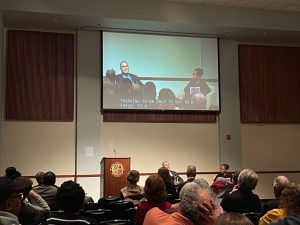The walls of McGuire Hall echoed with the words and wisdom of University of Maryland, Baltimore County (UMBC) President Emeritus and activist Dr. Freeman Hrabowski during Loyola’s 31st Annual Martin Luther King, Jr. Convocation on Jan. 24. The evening began with a few words from President Terrence Sawyer and was followed by speakers including moderator Dr. Karsonya Wise Whitehead, Dr. Rodney Parker, and Rhona Little.
This year’s speaker, Dr. Freeman A. Hrabowksi, is most notably known in Baltimore for his role as President of UMBC from 1992 to 2022. In addition, Hrabowksi is also an author, civil rights activist, and educator, working alongside men like philanthropist Robert Meyerhoff to co-found the Meyerhoff Scholars Program for students who plan to pursue research and degrees in STEM. In 2011, Hrabowski was honored by former United States President Barack Obama to lead the Advisory Commission on Educational Excellence for African-Americans.
Parker, Loyola’s Chief Equity and Inclusion Officer, was second to speak after President Sawyer, where he welcomed the audience and touched on the importance of what this convocation provides. He then introduced Little, a Loyola Diversity and Inclusion Specialist, who briefly introduced the guest speaker and shed some light as to his life’s work. At this point, Hrabowski took the floor, intently posing a question to the audience.
“The ineluctable question for us as we reflect on MLK day and his life and civil rights, is who are we as a society?” Hrabowksi said. “Who are we and what are we as individuals as a president, as the head of an institute, as a student, as a community leader?”
Little briefly touched on Hrabowski’s childhood, growing up in Birmingham, Ala. in 1950 and being involved as a child leader during the Civil Rights Movement. For five days, Hrawbowski sat in jail at the age of 12 years old after marching in the Birmingham Children’s Campaign in 1963. Although he and the other children were exposed to inhumane living conditions over those five days, it was the visit they received from MLK himself that has stuck with him since.
“He said ‘what you do on this day will have an impact on children who have not yet been born’ and it was clear his message was we can be a part of the solution,” Hrabowksi said. “That was what changed my mind, that everybody in here has a chance to be a part of the solution and from then on, we believe in ourselves.”
In the early minutes of the discussion moderated by Whitehead, Hrabowski made the statement that one way to light the fire inside of the hearts of young people is through the idea of service. In particular, he pulled inspiration from the younger generations and how the mere act of teaching children to read can have a monumental impact on those to come.
“We want every child of any race to learn, not just to read, but to love to read. Did you hear the difference,” Hrabowski said. “It’s not enough just to read, it’s to understand what it means when children are less fortunate. And to know that those same children can do anything if given the love and support.”

Furthermore, Whitehead asked Hrawbowksi about what can be done to help young minds combat the poverty of imagination with the development and progress of technology. In response, he swiftly refers to the rejection of technology and writing for which the church is most historically known and the fact that it is here to stay. Hrabowksi then presses on, attesting that it is our responsibility to learn applications like AI and embrace it, using it to help us, not numb us.
“There are ways of using technology to enhance our understanding of ourselves,” Hrabowksi said. “It is a problem when we only use technology for the kind of enjoyment that makes us go deeper and deeper only into the technology and a game with no message.”
In the last few minutes of the discussion, Hrabowksi touches on the topic of diversity and his experiences not only as an educator but as a United States citizen. In an anecdotal story, he explains an interaction between himself and a UMBC student after the 2016 presidential election that was fueled by misinformation and anger. However, this interaction ended not only in an informed conversation but shed light on how important it is not to judge or attack others based on who they decide to vote for.
“There has to be a building of communal trust, where people can say what they really think without being attacked,” Hrabowksi said. “That they can disagree, like we say at UMBC, ‘learning how to agree to disagree, agreeably.’”










































































































